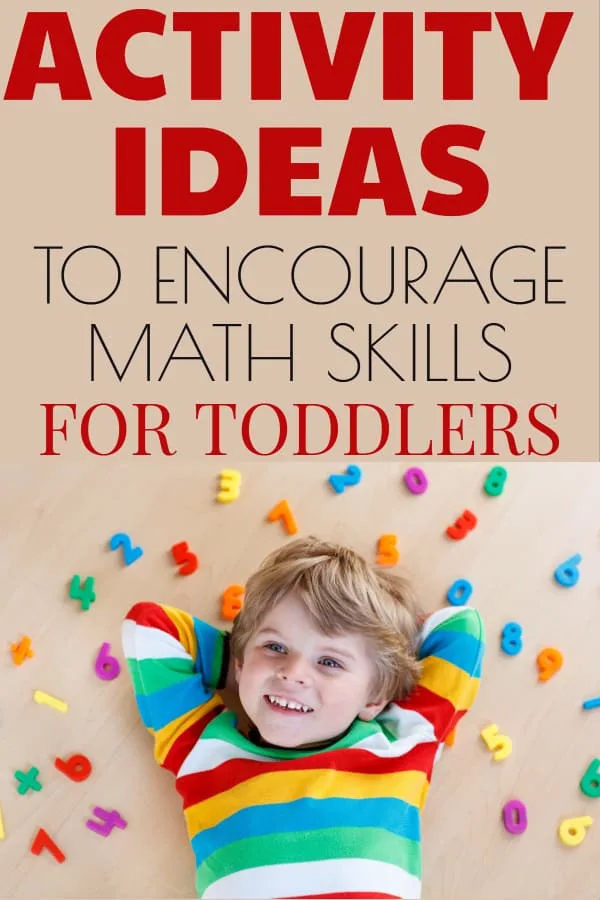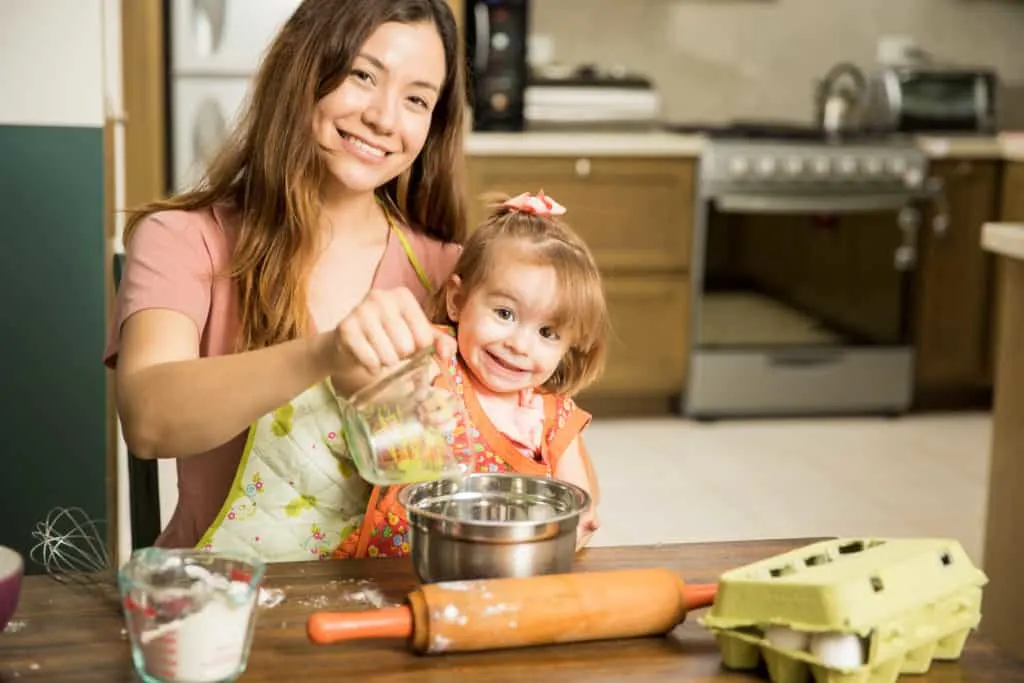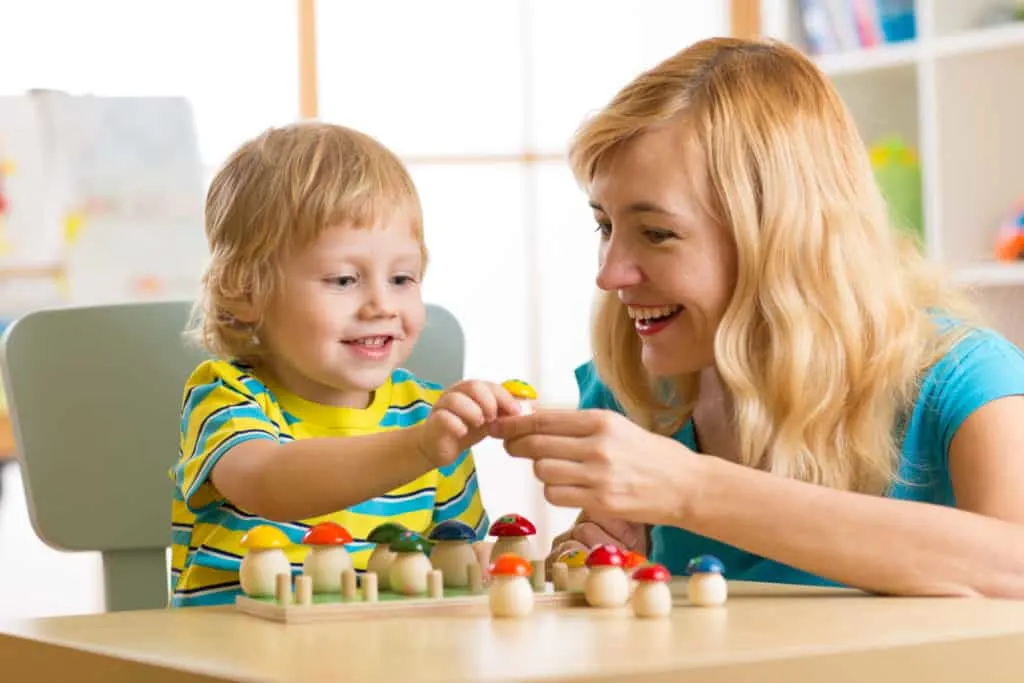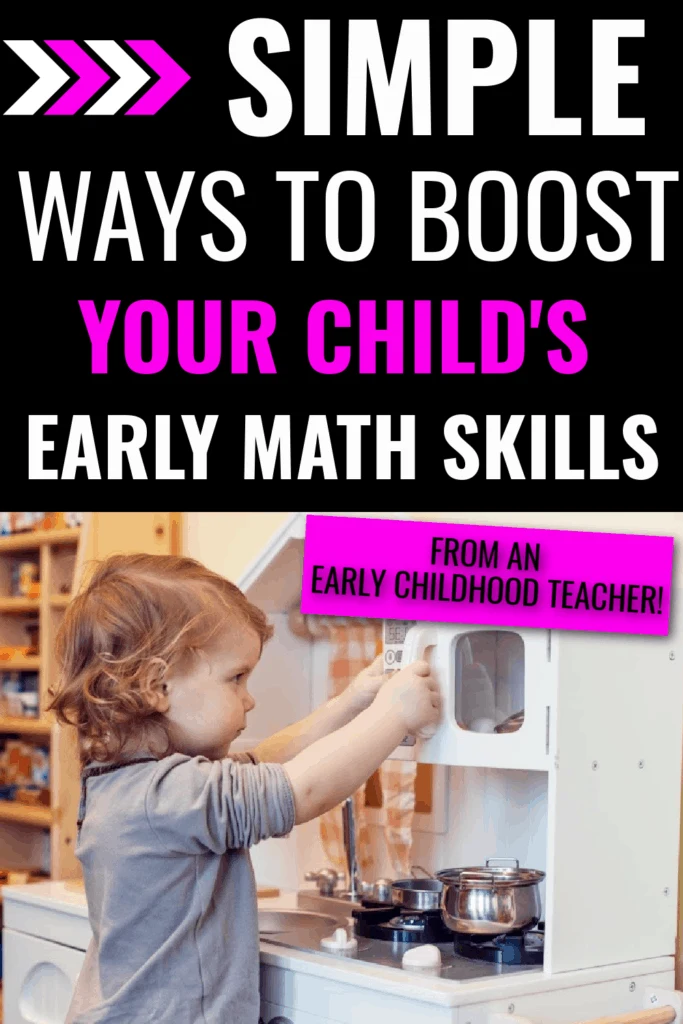Infants and toddlers are like sponges.
They soak up everything those first few years of life.
We make sure to encourage language development and motor skills…but what about math skills?
These skills can be taught to your child through play activities and daily routines just like any other skill.
In this post, you will discover what preschool math skills look like and easy math activities for infants and toddlers that you can do throughout the day.
Easy Math Activities for Infants and Toddlers

(This post contains affiliate links. To read our full disclosure policy click here.)
Math skills can be taught through play and daily routines. There is no need for worksheets or “formal” teaching methods at this age. Introduce math concepts such as counting, sequencing, and patterns with low pressure play activities.
Make it fun! When introducing math activities to young children keep the activities fun and playful. You can even work math concepts such as counting and teaching shapes into daily routines.
What are preschool math skills?
There are lots of skills that children use when they solve math problems at school age.
The preschool math skills that we work on in the early years are meant to support the learning that happens later on.
It is a collection of skills that may not look like they relate to math on the surface but if we really think about what a specific skill allows a child to do later on we can see why even the most basic of skills are important.
What do infant math skills look like?
So when we think about infant math skills this could mean things like simple problem solving skills like being able to find a toy that is hidden underneath a cloth.
Imitation is also an underlying skill that supports almost every other element of development.
Your baby being able to imitate clapping shows that they are able to watch you and do what you are doing.
How does that relate to math?
Learning to write numbers is all imitation. Kids are shown what the number looks like and then expected to reproduce it.
They also start to understand simple concepts that relate to math.
For example, when they are splashing water with their hands in the bathtub, this is them learning about cause and effect.
What do toddler math skills look like?
When thinking about math skills in toddler I still like to include those major areas of development that support math skills later on such as fine motor, cognitive, and language skills.
Skills in those areas will support math skills later on.
We need to continue to build fine motor skills so that when it comes to writing and math skills your child has the hand muscle strength and dexterity to do that.
They can strengthen those muscles through play doing things like playing with playdough or building with blocks.
There are also some other more concrete math skills that we start to see in the toddler years as well.
Those include things like:
- Patterns
- Basic Measurement
- Identifying Shapes
- Matching
- Sorting
- Basic number concepts
You can check out a full list of what math skills to expect in the early years here.
Should I use toddler math worksheets to teach my child?
Many people will search out pre-k math workbooks in order to make sure their little one is hitting all the right marks.
Those can be an ok option to do if your child shows interest and wants to.
I would not focus totally on that method for teaching the majority of math skills to your little one as learning through play and daily routines is usually more fun and motivating for the child and naturally allows for lots of repetitive practice.
Teach Shapes While You Are on a Walk
Using nature is one of the best ways to teach young children.
Being outdoors provides lots of learning opportunities and finding shapes is just one of them.
While you are on a walk with your little one point out the shapes of trees, leaves, houses, signs, and whatever else you see.
By labeling the shapes you are helping them learn the vocabulary and get familiar with them.
No need to start quizzing them on geometry…just casually add the names of shapes as they come up in your environment.
Introduce Counting While Doing the Laundry
Why not teach some skills while folding the laundry?
Folding laundry provides lots of opportunities to count.
You could count the socks as you pull them out of the dryer or count the shirts as you put them in the drawer.
You could incorporate colors by counting all the blue items or whatever color your child is interested in.
There are lots of ways to encourage learning through toddler chores when we get a bit creative!

Teach Measurement While Making Breakfast
Involving young children in cooking provides them with lots of experiences that will teach them about measurement.
When you are making oatmeal let them help you measure the oats or milk before you put it in.
You could also hand them a set of measuring cups to explore with while you cook to entertain them and get them familiar with them for when they use them with you later on.
Teach Sequencing By Establishing Daily Routines
Chances are you follow some sort of routine everyday.
If you do let your child know about it so that they can start to understand sequencing.
By using phrases like “We will put on your socks first and then your shoes,” is a perfect way to introduce the skill.
As they start to understand it more you can let them guess what is happening next.
Teach Patterns at Meal Times
Both of my children eat better when their food looks fun.
When you are prepping your child’s snack or meal, take an extra minute to make a pattern with it.
For example, if you are serving cheese and crackers simple lay them out in a cheese-cracker-cheese-cracker pattern and explain it to them when you give them it.
See if they will get creative and create a pattern as well.

Teach Math by Playing Games
Counting, matching, can easily be targeted when playing games with toddlers.
Using a quiet book or folder file game (like this) can give your child some structured time and help them learn about a topic they are interested in as well.
Have Fun Learning Throughout the Day
If you enjoyed this person that grab my free 5 day learning guide that will help you inspire learning all day long!

Grab your FREE Milestone Guide HERE.
Related Posts You Will Enjoy
Toddler Activities that Promote Independent Play
Simple Ways to Boost Toddler Language Development
Complete Guide to Infant and Toddler Milestones
Reading Tips for Toddler Parents
How to Handle the Two Year Old Sleep Regression


Kayla O’Neill has a master’s degree in education as well as a bachelor’s degree in special education with an emphasis in early childhood education. She has been working as a developmental therapist with babies and toddlers in early intervention since 2012. She is also a mom with two young children.